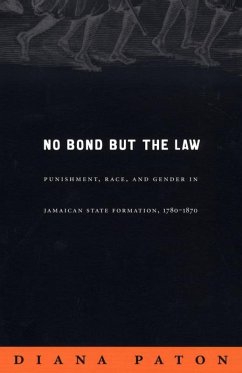Investigating the cultural, social, and political histories of punishment during ninety years surrounding the 1838 abolition of slavery in Jamaica, Diana Paton challenges standard historiographies of slavery and discipline. The abolition of slavery in Jamaica, as elsewhere, entailed the termination of slaveholders' legal right to use violence-which they defined as "e;punishment"e;-against those they had held as slaves. Paton argues that, while slave emancipation involved major changes in the organization and representation of punishment, there was no straightforward transition from corporal punishment to the prison or from privately inflicted to state-controlled punishment. Contesting the dichotomous understanding of pre-modern and modern modes of power that currently dominates the historiography of punishment, she offers critical readings of influential theories of power and resistance, including those of Michel Foucault, Pierre Bourdieu, and Ranajit Guha.No Bond but the Law reveals the longstanding and intimate relationship between state formation and private punishment. The construction of a dense, state-organized system of prisons began not with emancipation but at the peak of slave-based wealth in Jamaica, in the 1780s. Jamaica provided the paradigmatic case for British observers imagining and evaluating the emancipation process. Paton's analysis moves between imperial processes on the one hand and Jamaican specificities on the other, within a framework comparing developments regarding punishment in Jamaica with those in the U.S. South and elsewhere. Emphasizing the gendered nature of penal policy and practice throughout the emancipation period, Paton is attentive to the ways in which the actions of ordinary Jamaicans and, in particular, of women prisoners, shaped state decisions.
Dieser Download kann aus rechtlichen Gründen nur mit Rechnungsadresse in A, B, BG, CY, CZ, D, DK, EW, E, FIN, F, GR, HR, H, IRL, I, LT, L, LR, M, NL, PL, P, R, S, SLO, SK ausgeliefert werden.









